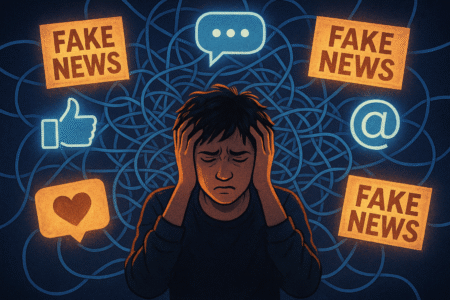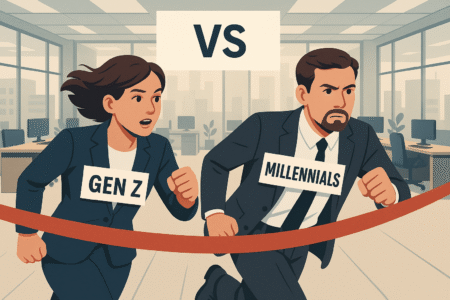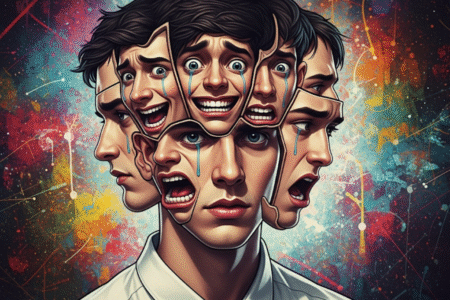The world of 2025 is one where opportunity and uncertainty collide. On one hand, humanity has never been more connected, technologically advanced, and resourceful. On the other, the World Economic Forum’s Global Risks Report 2025 warns of a cluster of social threats that are not only immediate but deeply interconnected: state-based armed conflict, extreme weather events driven by climate change, misinformation, and the societal impacts of artificial intelligence (AI). These issues demand urgent attention, not just from governments and institutions, but from every level of society. State-Based Armed Conflict: A Return to Instability Conflict is no stranger to human history, but its resurgence in 2025 underscores how fragile peace can be. Wars fueled by territorial disputes, political rivalries, and resource scarcity continue to displace millions, destabilize regions, and deepen humanitarian crises. Beyond the battlefield, these conflicts ripple outward—creating refugee crises, economic instability, and cultural fractures. To address this, societies must champion diplomatic solutions and peacebuilding initiatives rather than resorting to prolonged violence. Strengthening international institutions like the United Nations, supporting grassroots peace movements, and fostering intergovernmental dialogue can pave the way for negotiated settlements. Education also plays a critical role in countering narratives that glorify violence, helping young people envision futures built on cooperation rather than division. Climate Change and Extreme Weather: Nature’s Alarming Signals Climate change is no longer a distant threat; it is a lived reality. In 2025, extreme weather events—heatwaves, floods, droughts, and hurricanes—are disrupting food security, damaging infrastructure, and endangering lives. Vulnerable communities are bearing the brunt, while wealthier nations grapple with the mounting costs of recovery. The path forward requires collective climate resilience. Governments must accelerate commitments to renewable energy and stricter emissions targets, while industries should embrace green technologies and sustainable practices. But equally important is individual responsibility: reducing waste, adopting energy-efficient lifestyles, and supporting eco-conscious businesses. Local initiatives, such as community-led clean-up drives and sustainable farming projects, can make global goals more tangible and impactful. Misinformation: The Digital Pandemic In an age of constant connectivity, information travels faster than ever before—but so does misinformation. False narratives about politics, health, and science are shaping public opinion, dividing communities, and eroding trust in institutions. The viral spread of misinformation often triggers unrest, undermines democratic processes, and, in some cases, puts lives at risk. Combatting this requires a multi-pronged strategy. Social media platforms must be held accountable for monitoring harmful content while ensuring freedom of expression. Fact-checking organizations and independent journalism need greater visibility and support to provide accurate narratives. At the grassroots level, cultivating digital literacy is key. Schools, universities, and even workplaces should teach individuals how to critically assess sources, question online claims, and resist the emotional pull of sensationalized content. The Societal Impact of Artificial Intelligence Artificial intelligence has transformed industries, communication, and even healthcare. Yet, its rapid rise raises concerns: job displacement due to automation, ethical dilemmas in AI decision-making, and the potential misuse of generative AI in spreading disinformation. Left unchecked, AI risks deepening inequality, empowering surveillance states, and blurring the lines between reality and manipulation. But AI is not inherently harmful—it is a tool. Harnessing its benefits while minimizing its risks requires strong governance frameworks. Governments must collaborate with technology leaders to establish regulations around data privacy, algorithm transparency, and ethical usage. At the same time, society should invest in reskilling programs, preparing workers for jobs of the future rather than leaving them behind. The responsible use of AI in education, healthcare, and sustainability could, in fact, be one of the strongest weapons against inequality and environmental decline. Building a Resilient Society What connects all these challenges—conflict, climate change, misinformation, and AI—is their ability to destabilize trust. When trust between governments, citizens, and institutions breaks down, crises deepen. Therefore, the ultimate solution lies in rebuilding social cohesion. Communities must prioritize inclusivity, equity, and collaboration, ensuring no group feels left behind. Every individual has a role: advocating for peace, reducing their carbon footprint, questioning digital content, or learning about AI ethics. When collective action meets institutional reform, societies can turn today’s risks into tomorrow’s opportunities. The Global Risks Report is a wake-up call, but it is not a prophecy of doom. It is a challenge—a reminder that humanity has the creativity, resilience, and resources to overcome even the greatest threats. If we act decisively, cooperatively, and ethically, the very risks we fear today can become the driving force behind a more just, sustainable, and hopeful tomorrow. Keep Reading Foramz for your daily dose of moral support
In early August 2025, a single, sharply worded social media post turned a festering local nuisance in Gurugram into an administrative sprint. A Delhi-based woman, Anuradha Tiwari, posted a photograph of a large roadside garbage heap and called for volunteers to collect the trash and dump it “outside ministers’ bungalows.” The provocation was deliberate, the frustration palpable—and the results were immediate. Within hours of the post going viral on X (formerly Twitter), the Municipal Corporation of Gurugram (MCG) dispatched crews to the spot and cleared the area, later sharing proof-of-cleaning images to confirm action. Multiple outlets chronicled the chain reaction: outrage → virality → rapid remediation. It was a crisp demonstration of how visibility and public pressure can compress civic timelines from weeks to mere hours. The episode resonated so widely because it wasn’t a one-off grievance in a spotless city. Residents have been documenting Gurugram’s waste management troubles for months: overflowing roadside dumps, inconsistent pickup schedules, and the persistent scourge of illegal dumping. Reporters have watched as car after car casually offloaded polybags on vacant plots, normalizing what should be unacceptable. On social feeds and neighborhood groups, the images piled up alongside complaints that the system—contractors, monitoring, and enforcement—wasn’t keeping pace with the city’s growth. The viral post struck a nerve precisely because it captured a routine indignity that thousands recognized. That pressure has coincided with official attempts to change course. The MCG recently signaled a tougher stance on illegal dumping by invoking Section 15 of the Environment (Protection) Act, 1986, which allows fines and even imprisonment for violators. Vehicles caught dumping can be seized and blacklisted; at least one contractor has already been fined ₹1 lakh after residents flagged an incident. Administrators have also been urged to strengthen segregation norms and hold bulk waste generators accountable—moves meant to shift the burden from citizens who have been playing vigilante photographers to institutions tasked with maintaining order. At the same time, senior state officials have parachuted in to coordinate a cross-agency clean-up, acknowledging that the sanitation mess isn’t isolated to one department. For nearly a week, Haryana’s Chief Principal Secretary to the Chief Minister camped in Gurugram to hammer out an action plan with the MCG, GMDA, HSVP, DHBVN, and the district administration. The agenda spanned garbage disposal, road repairs, and even deterrence for waste burning—an attempt to stitch together fragmented responsibilities into a coherent response. The message was clear: the city’s reputation, public health, and quality of life hinge on getting basics right, consistently. Digital channels have become a crucial part of this new feedback loop. In one recent case, a Gurugram resident filed multiple complaints on the Swachhata-MoHUA app; the waste was cleared the same day, and the experience—posted online—sparked a mini-lesson on how to use official tech to trigger service delivery. Beyond individual apps, even community forums like Reddit’s r/gurgaon have turned into knowledge exchanges where residents trade tactics for escalation and share contact points that work. The social media post that went viral sits within this broader trend: citizens are learning how to turn attention into action. None of this, however, should distract from the deeper structural challenge that looms just beyond the neighborhood heap: the Bandhwari landfill. Its chronic fires, methane build-up, and toxic fumes have drawn rebukes from courts and green tribunals. The persistence of such systemic failures reminds us that cleaning a single stretch is necessary but insufficient. A citywide solution requires sustained investment in segregation, collection, transfer stations, scientific processing, and transparent contractor oversight. The attention a viral post generates can open the door; only relentless governance—and citizen cooperation—can keep it from slamming shut again. So what, precisely, happened in this case? A resident converted private exasperation into a public challenge. The post’s audacity—“let’s dump it at the powerful’s doorstep”—supplied the spark; the image supplied the proof; and the chorus of replies supplied momentum. Faced with an online snowball that could quickly turn reputational, local authorities did what residents had been requesting all along: they deployed, they cleaned, they communicated. The speed of that sequence—documented by national media and amplified by social accounts—proved how accountability can be catalyzed when administrators know citizens are watching and the press is ready to verify. Yet the moral of the story isn’t that shaming is the only route to service. It’s that visibility, clear asks, and channel fluency matter. When residents pair heat (viral visibility) with light (specific location details, timestamps, and follow-up proof), action becomes easier to demand and harder to deflect. Gurgaon’s civic story is being rewritten in real time: government experiments with sterner laws and integrated control rooms; technologists prototype citizen-reporting platforms; and ordinary people discover how to turn a camera phone into a civic lever. The road got cleaned because one person refused to scroll past the mess. The city will get cleaner, and stay that way, when thousands more decide to do the same—and when institutions meet that energy with systems that work whether or not a post goes viral. If one post can sweep a street, consistent policy and public participation can reclaim a city. Gurugram’s August clean-up is a case study in how attention, technology, and responsive governance can converge—briefly—to make things work as they should. The next step is making that convergence the norm rather than the exception. Keep Reading Foramz.com for more such blogs.
The modern office isn’t just about KPIs, Zoom calls, or water cooler chatter anymore. It’s become a quiet battleground — not of job titles or pay grades, but generations. In one corner, we have the Millennials — the side hustle warriors, the burnout romantics. And in the other, Gen Z — the boundary-setting, capitalism-questioning digital natives. What we’re witnessing isn’t just a shift in work culture — it’s a clash of values, vibes, and vocab. The Rise-and-Grind Millennials Born between 1981 and 1996, Millennials came of age during recessions, layoffs, and an economy that taught them one thing: survival means submission. So, they worked. Hard. Overtime was a badge of honor, not a red flag. They worshipped at the altar of hustle culture, turned productivity into identity, and saw their desks as second homes. They believe in loyalty, in climbing the ladder — and yes, in perfecting the art of the passive-aggressive “Just circling back…” email. The Boundaries-First Gen Z Enter Gen Z, born post-1997, into a system already broken — and unapologetically vocal about not fixing it with silence. They watched Millennials get crushed under toxic work norms and said: “No, thanks.” They came armed with therapy-speak, digital fluency, and work-life balance as a non-negotiable. For Gen Z, staying late doesn’t mean dedication — it signals poor management. And if the job doesn’t align with their mental health? They’ll quit on a meme. They communicate with soft language (“no pressure if not :)”) and sharp clarity. They don’t live to work — they work so they can live. Cold War or Culture Clash? The tension between the two isn’t loud. It simmers in Slack threads, sarcastic Instagram reels, and that subtle tone shift in office emails. Millennials think Gen Z lacks grit. Gen Z thinks Millennials glamorize suffering. It’s a silent war of survival vs evolution. Where Millennials endured the system, Gen Z is actively trying to dismantle it. Millennials adapted. Gen Z is disrupting. Lost in Translation This generational divide shows up in language, too: And the miscommunication isn’t just verbal — it’s emotional. Millennials see professionalism as restraint. Gen Z sees it as authenticity. Cue the collaboration breakdowns and passive Slack shade. So… What Now? Let’s be real — this conflict isn’t productive. Because when you zoom out, both generations are fighting the same system. Just with different weapons. Millennials brought us remote work, digital transformation, and the rise of freelancing. Gen Z is bringing us emotional intelligence, cultural accountability, and flexible-first thinking. Put them together? You get a workplace that’s not just functional — but future-ready. Final Thought This isn’t about who’s right. It’s about what’s next. The future of work isn’t generational. It’s intentional. And maybe, just maybe, the office doesn’t need another “OK Boomer” meme or an email about “office culture.” What it really needs is a conversation. So before you roll your eyes at that Gen Z intern who clocks out at 5 sharp — or scoff at that Millennial manager with ten color-coded calendars — pause. Ask a question. Share a story. Start a dialogue. Because the real enemy isn’t each other. It’s a work culture that still confuses exhaustion for excellence. Keep Reading Foramz for your daily dose of moral support.
In Part 1, we opened the door to understanding mental illness by challenging stigma, exploring its impact, and urging early awareness. Now, in Part 2, we step deeper into the world of mental health — exploring the types of mental illnesses, their hidden presence in daily life, and the critical need for treatment and support. Each story of mental illness is unique, yet many share similar patterns that often go unnoticed. Understanding these nuances can help us become more empathetic, informed, and supportive as a society. Mental illnesses are not one-size-fits-all. They range from mild disruptions in mood or thinking to severe conditions that drastically impact everyday functioning. Broadly, mental disorders fall into categories like mood disorders, anxiety disorders, psychotic disorders, eating disorders, and personality disorders. Among the most common is depression, which can bring overwhelming feelings of sadness, fatigue, hopelessness, and even physical pain. Then there’s anxiety, which is more than just nervousness — it’s a persistent fear or dread that can make even simple tasks feel impossible. Bipolar disorder causes intense mood swings, from emotional highs (mania) to crushing lows (depression), while schizophrenia involves hallucinations, delusions, and a distorted sense of reality. Obsessive-compulsive disorder (OCD) and post-traumatic stress disorder (PTSD) also fall into this complex web, each with its own triggers, symptoms, and challenges. These conditions don’t always show themselves clearly. In fact, mental illness is often hidden in plain sight. A student who is always anxious about failure, a colleague who seems unusually withdrawn, or a loved one who jokes about being tired all the time — these may be quiet cries for help. Unfortunately, our fast-paced lifestyles and societal expectations can discourage people from pausing to acknowledge these signs. We’re taught to “keep going,” to “stay strong,” to “not overthink” — phrases that, while well-intentioned, often invalidate the very real struggles people face internally. Adding to this complexity is the influence of society and culture on how mental illness is viewed. In many cultures, mental health remains a taboo subject. Admitting to a mental health condition is often equated with being “weak” or “unstable,” making individuals reluctant to seek help. Some families may deny the presence of a disorder altogether, dismissing it as a phase, laziness, or drama. In workplaces, the pressure to appear “professional” often discourages people from speaking up about burnout or emotional exhaustion. This silence and shame can delay treatment, worsen symptoms, and sometimes lead to tragic outcomes. But here’s what we must remember — help is available, and healing is possible. Treatment options for mental illness are more diverse and accessible than ever. These include therapy, counseling, medication, support groups, lifestyle changes, and more recently, online mental health platforms. Therapists and mental health professionals are trained to create safe, non-judgmental spaces where individuals can explore their thoughts and emotions. Contrary to popular belief, therapy is not just for people in crisis — it’s for anyone who wants to understand themselves better, improve coping strategies, and live a more balanced life. The journey to recovery may not be linear. There may be relapses, moments of doubt, and emotional setbacks. But with the right support system — friends who listen, families that understand, workplaces that care, and professionals who guide — it becomes easier to manage and live fully. Mental illness doesn’t have to define who someone is; it is simply one part of their human experience. In the next part of this series, we will focus on how you can support someone living with mental illness — what to say, what not to say, how to truly be there, and why even small acts of kindness can be life-changing. We’ll also explore how to build a mentally healthy environment at home, in schools, and at workplaces. Because the fight against mental illness isn’t just personal — it’s collective. We often wonder what to do when someone we care about is struggling — Do I say something? Should I give them space? What if I make it worse? These questions can feel overwhelming, and many of us stay silent out of fear of saying the wrong thing. But silence can sometimes speak louder than words. In Part 3, we’ll unlock the emotional toolkit everyone needs — how to offer real support, how to be a safe space, and how your words, actions, or even quiet presence might be the one thing that changes someone’s life. What does it truly mean to “be there” for someone battling a storm you can’t see? The answers may surprise you. So keep reading FORAMZ.
In a country as young as India—where over 65% of the population is under 35—youth should symbolize energy, innovation, and the bright future of a nation. Intoxication is the problem. Yet, for many, this phase of life turns into a desperate chase for survival, acceptance, and shortcuts to success. When jobs are scarce, dreams are expensive, and role models are replaced by influencers flaunting luxury, many young minds begin to believe that “easy money” is not just possible, but necessary. This is how the dangerous path of drug dealing becomes an illusion of hope. The Rise of the Young Dealers Meet Aditya. He’s 22, an engineering student, with dreams typical of his generation—an iPhone, a Bullet motorcycle, and a trip to Goa. At home, his mother struggles with high blood pressure, and his father is jobless. College fees are overdue, phone EMIs pile up, and there’s no safety net to fall back on. One day, a college friend introduces him to a “job”—selling MDMA. The promise? ₹5000 in a single day. No resumes, no degrees, no office—just money. Tempted and desperate, Aditya agrees. In his mind, it’s temporary. In reality, it’s the beginning of a nightmare. When Dreams Turn Toxic India’s National Crime Records Bureau (NCRB) reports a disturbing trend: a sharp rise in drug-related offenses among young men aged 18 to 25. Police reports from cities like Kochi suggest that nearly 60% of those arrested in drug cases are college students. Most of them are lured into the trade with two things—money and misdirected dreams. The problem isn’t limited to the act of selling drugs. Many young dealers eventually become users themselves. What starts as a source of income quickly becomes a trap. They begin to depend on the very poison they peddle. In trying to fund their aspirations, they end up eroding their future. A Symptom of a Larger Problem We often ask: Is the dealer to blame? Or is it the system that failed them? Youth today are growing up in an environment that emphasizes performance over patience, status over substance, and consumption over character. They are taught to score marks, follow trends, and upgrade constantly—phones, lifestyles, ambitions. But nobody teaches them how to struggle with dignity, to persevere without shortcuts, or to live with less while dreaming of more. Young men like Sameer—middle-class, hard-working, and helpless—sometimes turn to selling drugs to pay for a parent’s medical bills. Society may call them criminals, but their actions are often rooted in desperation, not evil. The Size of the Crisis India’s drug crisis is massive. Over 250 million Indians have tried some form of narcotics. Around 20 million inject drugs, risking HIV and other serious infections. The drug market in India is estimated to be worth over ₹1 lakh crore annually. But the real cost? It’s paid in shattered dreams, broken families, and a generation slowly drifting into darkness. Why It Matters This issue isn’t just about crime or addiction. It’s about lost potential. Every young person drawn into this trade is someone who could have been a builder of the nation—a teacher, engineer, artist, or entrepreneur. Instead, they become part of a black market that feeds off their vulnerability. What’s worse, many of them go unnoticed. They aren’t wearing tattered clothes or sleeping on sidewalks. They are in your classrooms, your metros, your hostels. Smiling on Instagram, and suffering in silence. The Way Forward There is no magic wand to fix this. But there is a solution—and it starts with awareness, empathy, and systemic change. A Message to the Youth If you’re young and reading this, know this: Quick money isn’t wealth, it’s debt in disguise. Sooner or later, it will come knocking—with interest. The job you take today, the choices you make—determine not just your income, but your integrity. There is pride in patience. There is beauty in struggle. And there is always a better way. Let us not allow the fire of our youth to be extinguished in the smoke of narcotics. Let’s ensure our dreams are earned, not sold. Because the future of a nation is not built in drug dens—but in the hearts and hopes of its young citizens. Keep Reading Foramz for your daily dose of moral support. Listen this blog on our podcast channel Social Republic.
Mental illness is one of the most misunderstood and overlooked health issues in society today. Despite growing conversations around mental health, many people still shy away from discussing their struggles, fearing judgment or misunderstanding. In a world that often prioritizes physical health and outward success, the inner battles people face remain hidden. But the truth is, mental health is just as important as physical health, and it’s time we break the silence surrounding it. Mental illness refers to a range of mental health conditions that affect mood, thinking, and behavior. These include common disorders like depression and anxiety, as well as more complex conditions such as bipolar disorder, schizophrenia, and post-traumatic stress disorder (PTSD). Each individual’s experience with mental illness is unique, with some needing short-term support, while others may require lifelong care and understanding. What’s important to remember is that mental illness is not a choice, a phase, or a weakness — it is a legitimate health condition that deserves compassion and proper treatment. The need to address mental health has never been more urgent. According to the World Health Organization, one in every eight people globally is living with a mental disorder. This number has been rising steadily, especially in the aftermath of the COVID-19 pandemic, which brought with it a wave of anxiety, loneliness, and emotional exhaustion. Children, teenagers, working professionals, and even the elderly — no age group has been spared. Unfortunately, even with such alarming statistics, awareness and access to help remain limited, and societal stigma continues to silence those who need support the most. Recognizing the signs of mental illness is the first step toward healing. Warning signs can include persistent sadness, withdrawal from social activities, drastic mood changes, sleep disturbances, overwhelming anxiety or fear, and trouble concentrating. In more serious cases, individuals may even experience thoughts of self-harm or suicide. These signs should never be ignored or brushed aside as “just a bad day” or “attention-seeking.” Just like we rush to help someone with a physical injury, the same urgency must apply to mental health crises. Perhaps the most harmful myth is that mental illness reflects personal weakness or failure. Nothing could be further from the truth. Mental health conditions often arise due to a complex mix of genetics, environmental factors, trauma, and brain chemistry. No one chooses to struggle, just like no one chooses to fall physically ill. What people battling mental illness need is not pity or advice, but empathy, understanding, and support. They need safe spaces to open up without fear of being judged. Mental illness doesn’t always look the way we expect it to. Sometimes it wears a smile in public and cries behind closed doors. It can be hidden in high achievers, busy parents, quiet teenagers, or even the friend who’s always making everyone laugh. This invisibility is what makes awareness so crucial because people often suffer in silence, even when surrounded by others. In the next part of this series, we’ll uncover how these hidden struggles manifest, the different forms they take, and why understanding them is key to creating a more compassionate and mentally healthy society. As we begin to peel back the layers of what mental illness truly means, one thing becomes clear — there’s so much more beneath the surface. Why do certain disorders go undiagnosed for years? What roles do culture, upbringing, and media play in shaping our beliefs about mental health? And most importantly, what does healing really look like in today’s fast-paced, hyperconnected world? In Part 2, we’ll dive deeper into the types of mental illnesses, how they silently affect daily life, and why seeking help is both brave and necessary. Stay with us — the conversation is just getting started. For more interesting content, keep reading FORAMZ.
In the digital age, students are immersed in screens – smartphones, tablets, laptops, or TVs – there is always something to watch, browse, or click. The advantage of technology is that it can be used for education and a way of communicating, but it brings an enormous challenge of digital distraction. Now, many teachers, parents, and even students themselves are concerned about a very serious issue: dwindling attention spans. Are students losing the ability to focus? Let’s take a look at what is happening and what to do about it. Digital distractions are things online or on a screen that divert attention from what you’re supposed to be doing. Here are some examples of digital distractions: Social media apps (like Instagram, Snapchat, TikTok) Messaging apps and notifications Online gaming YouTube and video streaming Constantly switching between many apps or browser tabs Even a little vibration or notification sound can interrupt a student’s focus or attention. Studies show that when distracted, it can take close to 20 minutes for the brain to return to full focus. The more students get accustomed to fast-moving scrolling, short videos, and continuous notifications, the harder it is for them to focus on longer-duration activities, like: Reading a textbook Writing essays Solving a math problem Listening to a lecture Studying without checking a phone Recent studies indicate the average attention span is declining from 12 seconds to about 8 seconds these days – shorter than a goldfish. Social media and games offer immediate rewards, comments, and wins that produce a pleasant feeling. This is an addictive feeling, and the brain wants more. Students want to stay up to date on the latest trend or message from friends. The challenge is that many students will attempt to study while also using their phones or watching videos. The brain was not designed to multitask. Without rules or scheduling, screen time can dominate everything. Keep the phone out of sight while studying. You can use apps like Forest, Freedom, or Focus Keeper to block distractions. The Pomodoro method is effective as well; 25 minutes of study work & 5 minutes of break. Most apps will also allow you to mute alerts for a while. You can train your attention again with just 10 minutes of meditation or deep breathing every day. You can also train your attention gradually by getting used to reading books again, just not on a screen. Technology may not be the enemy, but it is only as good as the way we use it. There are so many digital distractions today, and these distractions are reducing students’ ability to focus, study, and perform their best. Although there is no substitute for attention and focus, with knowledge, discipline, and a few good habits, students can learn to take back their time and attention. In the end, developing the ability to focus is just as important as being able to remember a lot of facts. The future belongs to those who can pay attention in an increasingly distracting world. Keep reading foramz
In the grave world of Kalyug, the value of life has been reduced. There are accident-prone emotions, natural calamities, and so much more that risk human lives today. Be it a massive airplane crash or a wildfire, the uncertainty of Life is increasing day by day. The massive damage that happens due to unexpected deaths is unexplainable. It is difficult to comprehend what the families of people who lost their lives might be feeling. In a sensitive time, it is important to support one another. Grieving becomes very important because if we don’t express it, we suppress it. Suppressing emotions leads to burnout, which later affects us. news — a plane crash somewhere, a young actress passing away suddenly from a heart attack. Someone who was smiling just hours ago is suddenly… gone. These events shake us to our core.And that’s exactly where today’s conversation begins. We’re living in an age that feels uncertain and unstable.There was a time when death seemed linked to old age, illness, or tragic accidents. But now?It comes uninvited, without knocking on the door.A heart suddenly stops beating, a plane disappears without warning, a life is lost in a split second on the road.It truly feels like life has turned into a glass bottle — delicate, unpredictable, ready to shatter at any moment. When we lose someone close to us suddenly, the pain is indescribable.It’s hard to believe that the person who was just beside us… is no longer here.Our mind keeps replaying the last time we saw them, the last thing we said.So many words are left unsaid.So many relationships end without a goodbye.We regret not saying more… not hugging one last time. But friends, the real question is — how do we deal with such grief?How do we stand up when the ground beneath us disappears? The first step is to accept the truth.Yes, this has happened. And yes, it’s affecting you.It’s okay to feel broken.Suppressing the pain only makes it worse.Cry. Talk. Reach out to someone and say — “I’m not okay.”That is the first step toward healing. We often think being strong means staying silent, not crying, not showing emotion.But real strength lies in accepting your emotions.You’re not alone.There are people around you who will understand your pain, who are ready to listen.And if you don’t have anyone close — seek help from a counselor, a helpline, or an online support group.Seeking help is not weakness — it is wisdom. Now, let’s talk about living.These sudden losses remind us of one powerful truth: none of us is immortal.So why not live every breath, every moment, to the fullest? Have you ever truly felt the sunlight on your face?Have you ever called a friend out of the blue just to say, “I miss you”?Have you eaten a meal with your phone aside and truly savored each bite? Friends, the real meaning of life is hidden in these small moments we often ignore.It’s not about living long, it’s about living fully.Live each day as if it were your last.Meet people as if it’s the first or the final time.Give time to your family.Nurture your dreams.And don’t suppress your desires. And yes — express your love.Tell the ones you love that you love them.Forgive those who hurt you.Life is too short for grudges.Sometimes, the fear of death teaches us the art of truly living — if we let it. Before I end this episode, I want to leave you with one line:“Death reminds us that time is limited, so make every moment priceless.” We can carry the lessons without wrapping ourselves in sorrow.And maybe, just maybe, that makes us better human beings. As we part today, I’ll just say this —Live your life in a way that if it ends suddenly one day, there are no regrets… only memories of a life well-lived. Keep Reading Foramz for your daily dose of moral support. Listen to this blog in audio form on our youtube channel Social Republic.
In our rapidly changing world, Artificial Intelligence (AI) is everywhere. Machines are becoming increasingly intelligent, too, whether it’s chatbots or self-driving cars. Though cool, many are asking the same question: “Will AI take jobs?” AI has many people feeling job insecurity. They are worried machines will take their jobs. This feeling is real and increasing. In this post, we will look into how AI impacts jobs, what types of work have the greatest risk, and what we can do to prepare ourselves. While these examples show AI making the project easier or projecting potential efficiency, the existence of AI could make the same jobs out of date. Job insecurity refers to people fearing that their job is at risk of disappearing or that their job won’t be safe in the future. Job insecurity is widespread and becoming more common as companies are implementing artificial intelligence (AI) to save time and money. AI is capable of working 24/7, does not need a break, and in many cases, can perform tasks faster than human workers. This serves the interests of a business while also creating fear for workers in general, and particularly workers in jobs that involve routine and repetitive tasks. AI will take away jobs that involve repetitive, data-driven, or manual tasks and positions like: Even creative jobs are replacing traditional roles as a consequence of new AI tools. This isn’t to say these jobs will disappear, but they may look different or become more competitive. Youth entering the workforce may find a shortage of entry-level positions, older workers may struggle to learn new digital tools or retraining, or low-skilled workers may miss the opportunity to reskill quickly. All of these groups also indicate that they have the highest stress and uncertainty levels or full employment. Although AI may eliminate some types of jobs, it also creates new ones. For example: AI trainers: Individuals who are helping AI systems learn how to think.Data analysts: Experts who analyze information to identify trends.Cybersecurity professionals: Protect AI systems from hackers.Digital marketers: As online businesses increase, they will be needed.Robotics engineers: Build and fix intelligent machines.Many new job roles require new skills, meaning people will need to continue to learn. Here are a few simple but effective actions you can take to lower work insecurity: Continue learning – Enroll in an online course on a growing digital skill, AI, or communication.Be flexible – Be willing to try new roles, or even a new industry.Develop soft skills – Things like teamwork, creativity, and empathy are difficult for AI to replicate.Embrace technology – Don’t be afraid of tools; learn how to use them to your advantage.Keep up with industry news – Read about trends in your industry and don’t be caught unaware. Do bear in mind that AI may support your work rather than replace it. There are studies that show that workers who use AI tools often create more value than workers who do not. The expansion of AI represents a massive shift, and like any massive shift, it includes challenges and opportunities. Job insecurity brought by AI is both evident and real, but it is not the end. It is a signal that the world of work is being disrupted. You don’t need to be a tech wizard; it isn’t like you have to go to school for it when you can just learn firsthand. However, you do need to adapt, learn, and grow. As long as you have the right attitudes and skills, you won’t just be able to protect your job, but find something even better in the future. Keep reading foramz
Love has always been complicated, but for Gen Z, it seems more complicated than ever. Rather than traditional dating or serious relationships, many young people are not interested in those anymore. They have a new sort of romantic connection that is emerging that has been labeled a situationship. So, what is a situationship? And why is it growing in popularity? Let’s take a closer look. A situationship is not quite a friendship and not quite a committed relationship. Two people could talk every single day, go out together, even be physical, but they have not given their relationship a clear label. They may say, “We’re just seeing where it goes” or “We don’t want to put a name on it.” In short, it is not officially committed, but by no means is it just casual. Being in a “situationship” is prominent in Gen Z culture today. Many young people often voice that they do not want the pressure of a serious relationship. They feel a real connection with the other person, yet they want to have the freedom. There are various root causes of the emergence and prevalence of situationships in Gen Z culture. Social media is a huge part of this trend as well. Young people see “perfect” relationships online with gifts, trips, love letters, etc. They often disregard what love really is, because in real life, love is much messier than it is online. Instead of meeting these expectations, some decide to not define their relationship at all. On TikTok, YouTube, and Instagram, creators all over are discussing their situationships. Some make light of it. Some talk deeply about the pain that is associated along with the confusion. Regardless, it is clearly a prevalent conversation within GenZ, making it a normative aspect of their culture. Situationships have both good and bad things. The good: The bad: Some people enjoy situationships. Others become hurt or disappointed because they believe they are in a relationship, and the other person does not feel the same way. Relationship experts and psychologists emphasize that communication is the best ingredient for a successful situation. If both people know what they want, it can work. But when one person starts to expect more, like exclusivity or emotional support, it can be uncomfortable.Experts remind us that Gen Z is not “cold” or “unromantic.” They are just trying to protect themselves. They have an appreciation for mental health, personal boundaries, and emotional honesty. This isn’t to say romance is disappearing. However, romance is changing. Now more than ever, Gen Z is challenging traditional norms of dating, marriage, and labels. Some are trying out open relationships, others are exploring gender-fluid roles in their partnerships, or long-distance love online. The idea of love is becoming versatile. Situationships don’t necessarily have to indicate an end in romance. For some individuals, situationships are a short-term step before they move on to the next serious relationship. For others, situationships are a comfortable place for those who don’t want any labels attached to their relationships. Every generation has its way of loving. For Gen Z, love doesn’t always come with a label or a status update. It’s more private, more flexible, and sometimes more confusing. But in the end, the search is the same: people still want to feel seen, understood, and cared for. Whether in a situationship or a serious relationship, the most important thing remains the same: honest communication and mutual respect. Keep reading foramz










